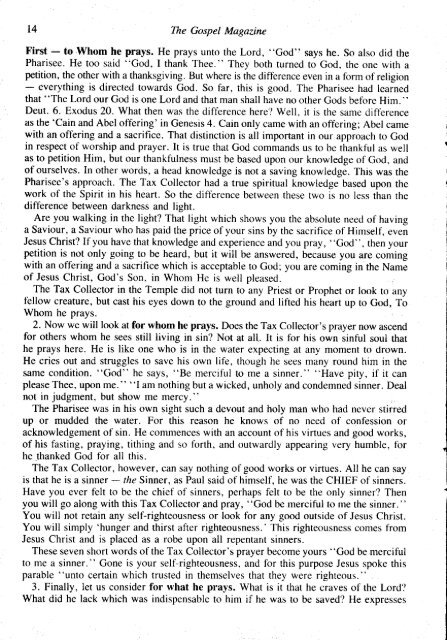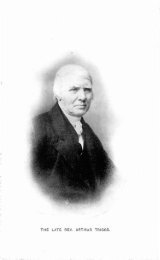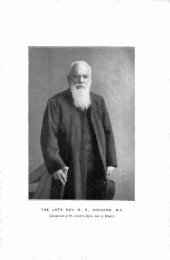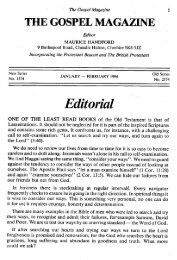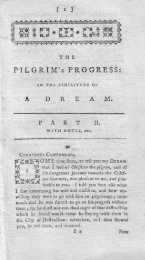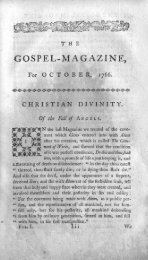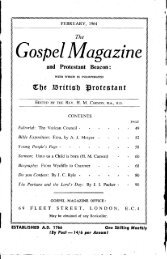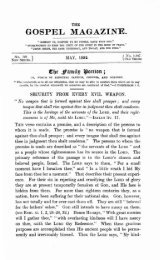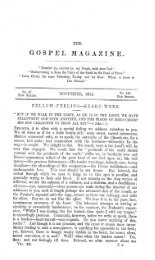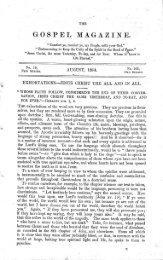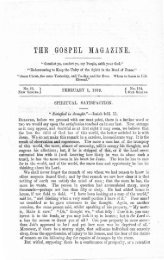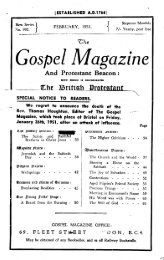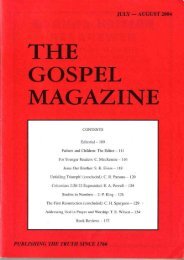January-February - The Gospel Magazine
January-February - The Gospel Magazine
January-February - The Gospel Magazine
You also want an ePaper? Increase the reach of your titles
YUMPU automatically turns print PDFs into web optimized ePapers that Google loves.
14 <strong>The</strong> <strong>Gospel</strong> <strong>Magazine</strong><br />
First - towhom he prays. He prays unto the Lord, "God'r says he. So also did the<br />
Pharisee. He too said "God, I thank rhee." <strong>The</strong>y both turned to God, the one with a<br />
petition, the other with a thanksgiving. But where is the difference even in a form of religion<br />
- everything is directed towards God. So far, this is good. <strong>The</strong> Pharisee had learned<br />
that "<strong>The</strong> Lord our God is one Lord and that man shall have no other Gods before Him. "<br />
Deut. 6. Exodus 20. What then was the difference here? Well, it is the same ditference<br />
as the 'cain and Abel offering' in Genesis 4. cain only came with an offering; Abel came<br />
with an offering and a sacrifice. That distinction is all important in our approach to God<br />
in respect of worship and prayer. It is true that God commands us to be thankful as well<br />
as to petition Him, but our thankfulness must be based upon our knowledge of God, and<br />
of ourselves. In other words, a head knowledge is not a saving knowledge. This was the<br />
Pharisee's approach. <strong>The</strong> Tax Coilector had a true spiritual knowledge based upon the<br />
work of the Spirit in his heart. So the difference between these two is no less than the<br />
difference between darkness and light.<br />
Are you walking in the light? That light which shows you the absolute need of having<br />
a Saviour, a Saviour who has paid the price of your sins by the sacrifice of Himself, even<br />
Jesus Christ? Ifyou have that knowledge and experience and you pray, "God", then your<br />
petition is not only going to be heard, but it will be answered, because you are coming<br />
with an offering and a sacrifice which is acceptable to God; you are coming in the Name<br />
of Jesus Christ, God's Son, in Whom He is well pleased.<br />
<strong>The</strong> Tax Collector in the Temple did not turn to any Priest or Prophet or look to any<br />
fellow creature, but cast his eyes down to the ground and lifted his heart up to God, To<br />
Whom he prays.<br />
2. Now we will look at for whom he prays. Does the Tax Collector's prayer now ascend<br />
for others whom he sees still living in sin? Not at all. It is for his own sinful soul that<br />
he prays here. He is like one who is in the water expecting at any moment to drown.<br />
He cries out and struggles to save his own life, though he sees many round him in the<br />
same condition. "God" he says, "Be merciful to me a sinner." "Have pity, if it can<br />
please <strong>The</strong>e, upon me. " "I am nothing but a wicked, unholy and condemned sinner. Deal<br />
not in judgment, but show me mercy."<br />
<strong>The</strong> Pharisee was in his own sight such a devout and holy man who had never stirred<br />
up or mudded the water. For this reason he knows of no need of confession or<br />
acknowledgement of sin. He commences with an account of his virtues and good works,<br />
of his fasting, praying, tithing and so forth, and outwardly appearing very humble, for<br />
he .thanked God for all this.<br />
<strong>The</strong> Tax Collector, however, can say nothing of good works or virtues. All he can say<br />
is that he is a sinner - l/re Sinner, as Paul said of himself, he was the CHIEF of sinners.<br />
Have you ever felt to be the chief of sinners, perhaps felt to be the only sinner? <strong>The</strong>n<br />
you will go along with this Tax Collector and pray, "God be merciful to me the sinner. "<br />
You will not retain any self-righteousness or look for any good outside of Jesus Christ.<br />
You will simply 'hunger and thirst after righteousness.' This righteousness comes fiom<br />
Jesus Christ and is placed as a robe upon all repentant sinners.<br />
<strong>The</strong>se seven short words of the Tax Collector's prayer become yours "God be.merciful<br />
to me a sinner." Gone is your self-righteousness, and for this purpose Jesus spoke this<br />
parable "unto certain which trusted in themselves that they were righteous."<br />
3. Finally, let us consider for what he prays. What is it that he craves of the Lord?<br />
What did he lack which was indispensable to him if he was to be saved? He expresses


